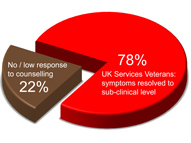The charity PTSD Resolution organises one-day courses on ‘Trauma Awareness Training for Employers’ for line managers, HR professionals and others in the security sector. Visit www.ptsdresolution.org.
The next TATE course is on Monday Feb 23 2015, central London, writes Patrick Rea, Trustee Director.
If a security incident occurred, how would you know if one of your security team was traumatised – or a member of the client’s staff or their customers was affected? What would be your responsibility for identifying if there was a problem? With heightened security levels in the UK, employers need to be ‘trauma aware’ in 2015. This is because of the potential exposure of security staff to a traumatic event – but also the increase in the numbers of UK armed forces’ veterans in the workplace, many of whom have seen active service and experienced some distress.
Trauma can produce depression and behavioural problems for staff in the workplace, whether the condition was caused during or long before their current employment. Without treatment, the result can be extended sick-leave and dismissal, and a legal liability for the employer. Post-Traumatic Stress Disorder (PTSD) affects up to 30 per cent of people who experience a traumatic event in the general population (source: NHS 2011).
In the security sector the incidence of trauma is much higher, because of the nature of the work in close protection, manned guarding and other roles – and due to the disproportionately large number of armed forces services’ veterans and reservists employed,.
Duty of care
This is not a reason not to employ armed forces’ veterans: the skills and experience that they bring are often unique and indispensable. But security companies within their duty of care to employees and clients must be able to recognise the symptoms of trauma and to understand when and how to refer a sufferer for treatment. Whilst staff may not want an official diagnosis of PTSD, perhaps because of any associated stigma or any effect on their medical records, they could require help to deal with the symptoms of trauma. These include poor sleep, nightmares, anger and excessive alcohol or drug use, which can impact on both work and home life.
Reliance on a visit to a GP is often not good enough, because the present treatment pathway can be slow and may rely on inappropriate use of medication, with variable quality of outcomes. Here are five effective steps that line managers can take:-
1. Develop a company culture that is responsible but not ‘macho’. Operational machinery is maintained regularly and repaired when necessary, so it is rational to adopt the same approach with your people, as a minimum.
2. If you manage people who may experience trauma, keep an eye on their behaviour. If someone is involved in an incident and seems to have changed, it may be a sign that they will need help.
3. When you have a concern, perhaps because of security incident, let staff know that you are aware of what they have been through; that the company policy is open about stress reactions and to get help if necessary so that everyone can continue to work well together.
4. If an employee does not seem to be returning to their normal attitudes, demeanour and behaviour after a few weeks, open a dialogue about how they would like to be helped to recover.
5. Develop a relationship with a supplier that has experience of post-traumatic reactions and can deliver brief interventions that return people to work.
The cost of a typical course of treatment should be very much less than the costs of supporting an unwell employee down the line – or worse still coping with the collateral damage if someone does something unfortunate while traumatised in your employment.
Training
Few employers can recognise the symptoms of trauma unaided – far less assist employees constructively and find out if they need help and then arrange appropriate treatment. This is why PTSD Resolution introduced TATE: Trauma Awareness Training for Employers. It is a one-day course, held in in central London. Also, in-house courses can be organised with employers and security associations. The registered UK charity (number 1133188) provides trauma treatment to military veterans. However, such has been the demand for help from employers that Resolution set up workshops to help company owners, line managers, human relations specialists and other staff to recognise and deal with the problem of trauma, however caused.
Next TATE Course: Monday Feb 23 2015, central London. Visit www.ptsdresolution.org.










